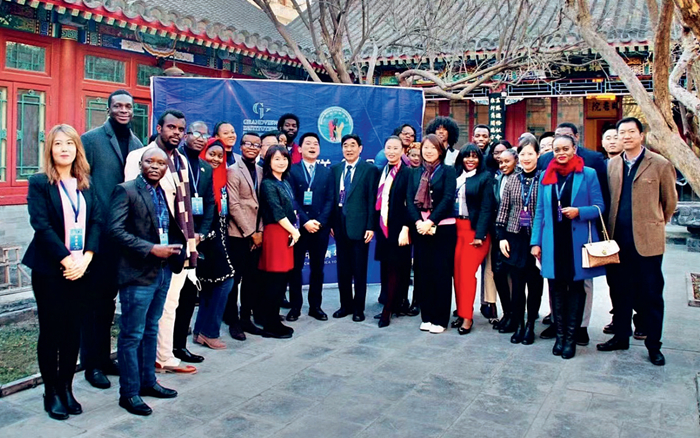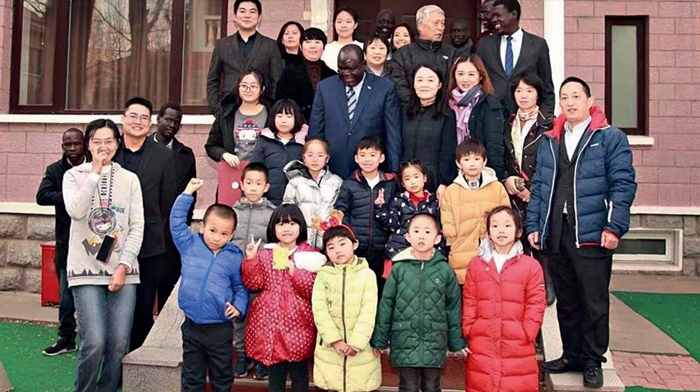|
||||||||||
| Home Nation World Business Opinion Lifestyle ChinAfrica Multimedia Columnists Documents Special Reports |
|
||||||||||
| Home Nation World Business Opinion Lifestyle ChinAfrica Multimedia Columnists Documents Special Reports |
| ChinAfrica |
| Groundwork for Lasting Association |
| Despite the COVID-19 pandemic, the China-Africa youth organizations strive to push forward collaboration through various activities |
| By Donatien Niyonzima 丨VOL. 14 JUNE 2022 ·2022-06-14 |

CAYF holds its first anniversary celebration, on December 18, 2020 (CAYF)
The youth play an important role in fostering China-Africa relations in a variety of ways. They serve as the foundation for the initiatives undertaken by the two sides. Their contribution is reflected through many youth organizations that operate in various fields such as culture, investment, cooperation, tourism, and so on. Among these is the China-Africa Youth Federation (CAYF), which was established with the goal of providing a platform for communication and friendly consultation among the youth engaged in economy, culture, education, and other areas.
The CAYF was established in July 2019, which represented a new stage in the development of China-Africa cooperation. Taking the philosophy of “amity” as its starting point, China-Africa ties are reinforced via collaborative effort of youth from both sides through the CAYF, where they are united through dialogue and concrete initiatives.
Zhou Yefan, Co-Founder of the CAYF, commented that the idea to start this federation was inspired by the Forum on China-Africa Cooperation’s mission and the African Union’s development ambitions. This idea is guided by the principles of equal interaction and friendly negotiation.
“I learned more about the African history and culture at an event when I was entrusted with taking Chinese youngsters to tour African embassies. I also learned more about the two sides’ cordial connections. This unique experience for the Chinese people who took part in those activities spurred the idea to create a non-governmental platform for Chinese and African youth collaboration,” he told ChinAfrica.
The founders intend to use this platform to help more Chinese and African youth have a better understanding of each other’s cultures and promote deeper human connections.
Importance of youth
According to research by the Mo Ibrahim Foundation (2020), Africa’s population is already the youngest in the world, with a median age of 19.7 in 2020. It is estimated that about 60 percent of Africa’s population is under the age of 25, with more than a third falling between the ages of 15 and 34. Africa should still have the world’s youngest population by 2100, with a median age of 35. At the same time, statistics from China’s Seventh National Population Census conducted in November 2020 show that China has 253.38 million persons in the age group of 0 to 14, accounting for 17.95 percent, and 894.38 million persons in the age group of 15 to 59, accounting for 63.35 percent. This indicates, in terms of demographics, both China and Africa are relatively youthful partners.
According to the World Bank, the age makeup of a country’s population influences its development patterns. Varied age groups have different environmental and infrastructural requirements. As a result, the age structure of a population is valuable for analyzing resource utilization and developing future policy and planning goals for infrastructure and development.
In an interview with ChinAfrica, Li Xinfeng, Executive President of the China-Africa Institute at the Chinese Academy of Social Sciences, claimed that the Chinese and African youth organizations that focus on China-Africa relations are essential bridges to cement the two sides’ excellent and long-lasting relations.
“They are well-organized to fight for a better future for China and Africa,” he said, adding that at the China-Africa Institute, which he heads, “we do support these initiatives through academic lectures that we offer to them in order to bring them together to academically discuss concerns as they are the hopes of tomorrow. We feel they are among the best choices for going out and inspiring the rest of the Chinese and African youth.”
Li suggested that China-Africa youth organizations operate as bridges, bringing communities together and educating them about each other. He thinks that the roots and lifeblood of China-Africa friendship are in the people, and that the purpose of China-Africa relations is to benefit the people.
“We encourage young Africans to visit China and learn about the history, culture, customs, and so on,” Li noted.
Through these activities, the youth contribute to the development of their respective nations while learning from each other as well. They are committed to strengthening people-to-people connections, which means broadening the range and frequency of communication processes is a possible approach to establish and sustain their relationship.
Zhou emphasized the importance of youth in maintaining China-Africa relations by stating that the two sides have long treasured people-to-people interactions, as a result of which, the Chinese and African people are well acquainted, and China-Africa friendship has been built on a strong social foundation.
“China-Africa friendship is forward-looking, and for it to thrive, aspiring Chinese and African youth must work together from generation to generation. China and Africa should encourage youth exchanges to keep their partnership alive and well,” Zhou said.

CAYF members guide Chinese kids to visit South Sudan Embassy in Beijing, on January 18, 2019 (CAYF)
Pandemic impact
The activities of youth groups have been discontinued or moved online due to the COVID-19 pandemic. Many planned activities, such as traveling to China and Africa, organizing events in both China and Africa, and establishing China-Africa Youth Federation offices in African countries, have been put on hold.
Despite these disruptions, the CAYF never stopped moving forward, according to Zhou. They’ve formed significant alliances with other groups in China and Africa that operate in the fields of innovation and collaboration. They collaborate to encourage young Africans to form their own enterprises and start their own businesses. At the same time, they actively participate in educational and cultural exchange programs.
“We now have an education program that involves African students in China working as teachers,” Zhou explained. They prepare classes from their own textbooks and video tape them as prerecorded courses. This is done to optimize the cost of establishing schools and teacher salaries, as well as to ensure that more children, particularly those from rural areas, receive education.”
CAYF’s plans include an activity called African Corner, which will bring together Chinese youth and Chinese businesses to learn about and experience African history, culture, resources, and investment policies, in order to encourage them to prepare for future economic engagement.
|
||||||||||||
| About Us | Contact Us | Advertise with Us | Subscribe |
| Copyright Beijing Review All rights reserved 京ICP备08005356号-5 京公网安备110102005860号 |